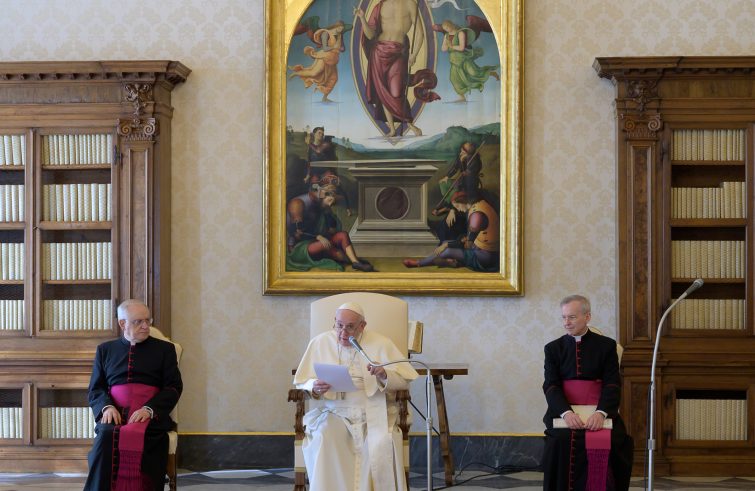
“If all our Christianity does not lead us to mercy, we have taken the wrong path, because mercy is the only true destination of every spiritual journey.” In the second livestreamed general audience from the Library of the Vatican Apostolic Palace, the Pope reiterated one of the guiding pillars of his pontificate, a key theme of his first Angelus prayer as a Pope, as he recalled in impromptu remarks. “That day – Francis said – I felt so strongly that this is the message I must give, “as Bishop of Rome”: mercy.
In fact “Mercy is not one dimension among others, but rather it is at the centre of Christian life: there is no Christianity without mercy”; it’s “the air we breathe.” At the end of the audience the Pope called upon the faithful to join the Italian Bishops’ initiative to recite the Rosary in the family tomorrow, feast of Saint Joseph – “I will accompany you from here” – along with a special prayer for doctors, nurses, and volunteers, “who risk their lives” in their service to all those affected by the Coronavirus.
“We are all “in deficit” in life. And we are in need of mercy”,
Francis added impromptu in the catechesis of today’s audience devoted to the fifth Beatitude. ““Blessed are the merciful, for they will be shown mercy.”
“We know that we too have done wrong, there is always something good that is missing, that we should have done”, the Pope pointed out: “But it is precisely this poverty of ours that becomes the force for forgiveness!.” “We are debtors and if, as we heard at the beginning, we will be judged with the measure with which we measure others then it is best for us to extend the measure and remit debts, forgive”, his invitation. “If the fifth Beatitude promises finding mercy and in the Lord’s Prayer we ask for the remission of sins, it means that we are essentially debtors and we need to find mercy!” The Pope said:
We are all in debt. All of us. To God, Who is so generous, and to our brothers. Every person knows he is not the father or mother he or she should be, the husband or wife, the brother or sister.”
“There are two things that cannot be separated: forgiveness granted and forgiveness received”, the Pope explained: “But many people find themselves difficulty, and are unable to forgive. Very often the harm suffered is so great that being able to forgive seems to be like scaling a very high mountain”, “an enormous effort”, that we are not able to face alone, “it takes the grace of God, we must ask for it.” “Those who show mercy will find mercy, they will be accorded mercy”, the reciprocity of the fifth Beatitude, “t is the only one in which the cause and the fruit of happiness coincide.” Indeed, mercy is a recurring theme throughout the Gospel, for it is “the very heart of God!” And in fact in the Lord’s Prayer we pray: “And forgive us our debts, as we forgive our debtors”
“The mercy of God is our liberation and our happiness” for “We live on mercy and we cannot afford to be without mercy.
It is the air we breathe.
We are too poor to set conditions, we need to forgive, because we need to be forgiven.” “Every person should remember they need to forgive, they are in need of forgiveness, and they need patience”, is the Pope’s counsel, for whom “this is the secret of mercy: by forgiving, one is forgiven. Because God precedes us and He is the first to forgive us. Receiving His forgiveness, we in turn become capable of forgiving. Thus one’s own misery and one’s own lack of justice become an opportunity to open oneself up to the kingdom of heaven, to a greater measure, the measure of God, Who is mercy. Where does our mercy come from? Jesus told us: ‘Be merciful, just as your Father is merciful’. The more one welcomes the love of the Father, the more one loves.”










